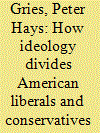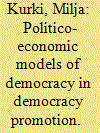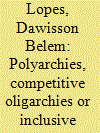| Srl | Item |
| 1 |
ID:
137799


|
|
|
|
|
| Summary/Abstract |
IN A SERIES OF ARTICLES AND A BOOK ON THE ISRAEL LOBBY, realist international relations theorists John Mearsheimer and Stephen Walt argued in 2006–2007 that America's virtually unqualified support for Israel was damaging the U.S. national interest. “Now that the Cold War is over, Israel has become a strategic liability for the United States,” they argue. “Washington's close relationship with Jerusalem makes it harder, not easier, to defeat the terrorists who are now targeting the United States.”1 America's disastrous Middle East policy, they further contend, is best explained by the pernicious influence of the “Israel lobby” in Washington, especially wealthy Jews and the right-wing American Israel Public Affairs Committee (AIPAC).
|
|
|
|
|
|
|
|
|
|
|
|
|
|
|
|
| 2 |
ID:
132350


|
|
|
|
|
| Publication |
2014.
|
| Summary/Abstract |
This piece examines the curious nature of the conceptual foundations of current democracy promotion practice. I point out that while it is broadly accepted today that a liberal democratic politico-economic model should stand at the heart of democracy promotion, the scholarly literature on democracy-capitalism relationship stands in sharp contrast to this consensus in highlighting the contested nature of this relationship. Through a survey of some of the key theoretical texts on capitalism and democracy, and a brief empirical survey of politico-economic contours of current democracy promotion, this article highlights the poorly thought-through links between capitalism and democracy in current democracy promotion. It is argued here that un-reflexive conjoining of democracy and liberal capitalism and sidestepping of the plurality of nuanced positions on this relationship in scholarly literature is problematic and that revisiting the lines of contestation over the relationship between capitalism and democracy is deeply consequential for re-evaluating and revising democracy and market promotion policies in the current context of "dual crisis" facing democracy promoters today.
|
|
|
|
|
|
|
|
|
|
|
|
|
|
|
|
| 3 |
ID:
153875


|
|
|
|
|
| Summary/Abstract |
In this article, I assume that global intergovernmental organizations (GIGOs) function as enablers of interstate liberal politics by way of their multilateral institutional frameworks. To support this view, I recall and adapt the classical concept of ‘polyarchy,’ coined in the early 1950s by Robert A. Dahl. It consists of a two‐dimensional theoretical construct applicable for measuring the level of liberalization in modern political societies. It follows that the more actors who take part in politics, and the more such institutions allow political opposition, the more open a society (of states) is likely to be. I therefore assess and rate the level of polyarchization of 23 GIGOs that cover various issue areas and fit some specific criteria (for example, more than one hundred member states from at least three different continents). Methodology includes a scorecard developed to help achieve these research objectives.
|
|
|
|
|
|
|
|
|
|
|
|
|
|
|
|